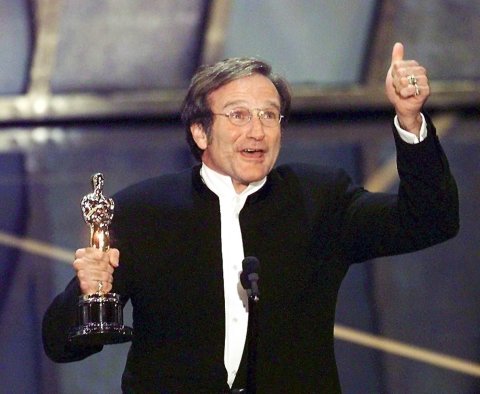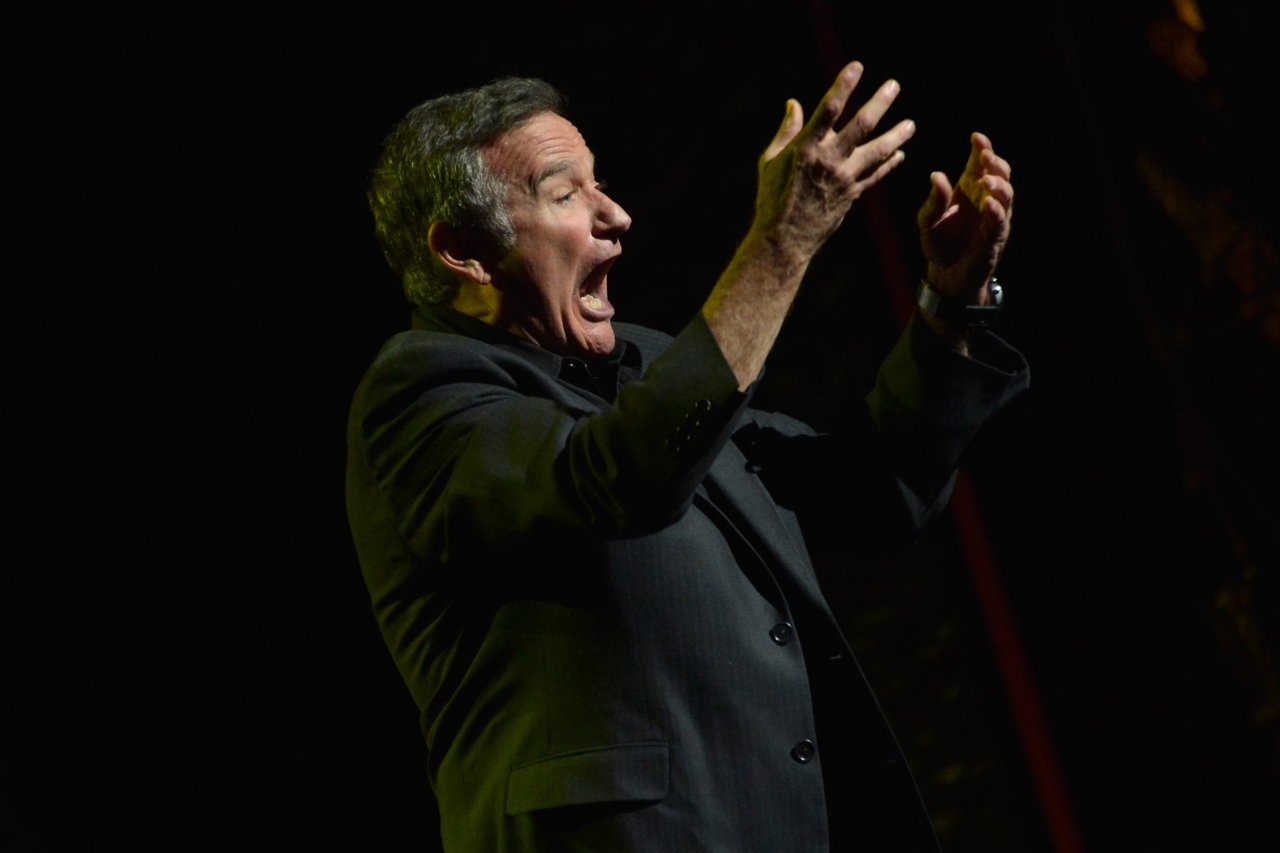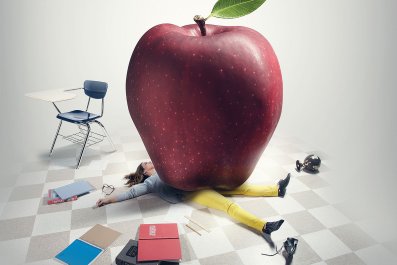On June 11, 2004, Billy Crystal was watching Ronald Reagan's funeral on TV. His phone rang.
"Bill," the voice on the other end said. "Hi. It's Ron Reagan." It sounded just like the 40th president—the friendly voice, the folksy affect. "I wanted to tell you that I'm in heaven now. I'm having a wonderful time." Crystal played along: "Oh, really? What's heaven like?" "Well," the voice replied, "it's a lot hotter than I thought it would be."
Crystal tells this story in the new HBO documentary Robin Williams: Come Inside My Mind, about one of the many prank calls from his longtime friend and occasional comic partner. It was classic Williams: a riotous gag from a man with an insatiable desire to make people laugh. Williams took his own life on August 11, 2014, and the new film, by director Marina Zenovich, is a reminder of just how singular his talent was.
The documentary takes its ambiguously naughty title from an early Williams routine, a typically manic bit in which he mimics the panicky brain of a comedian struggling to land a joke. He winds up flailing around in distress, like a shipwrecked sea captain: "Mayday! Mayday!" The subtext: For Williams, landing a joke was a function of survival. The manic humor was always intermingled with a certain vulnerability, the film suggests. "That laugh is a drug," Crystal says in the film. "That thrill is really hard to replace with anything else."
Williams often talked (and joked onstage) about his battles with alcohol and drug addiction, which began during his stand-up years in '70s San Francisco. After his friend John Belushi fatally overdosed in 1982, "it sobered the shit out of me," Williams says in the film. The two had been partying together just hours before on Sunset Boulevard. (In a 1992 interview with Lawrence Grobel for Playboy—audio that Zenovich tracked down for the film—Williams describes his '80s drug debauchery as a form of madness: "It was kind of like my head was in a bell jar.") Later in life, Williams would relapse with drinking again and again.
During interviews, Zenovich heard over and over about the comedian's generosity. "He couldn't see a homeless man without giving him money. And of course the homeless guy recognizes [him]," says the filmmaker, whose 2013 documentary, Richard Pryor: Omit the Logic, captured another troubled and radical comic. "He had to have that little moment of connection with everyone. I think that got exhausting. But he needed it."
Williams was known to everyone and yet a mystery to many who knew him best. The film "doesn't focus on the end," Zenovich says. Nor does it try to explain what caused it. Rather, it captures the radical breadth of his rubber-faced, rapid-fire, man-child brand of comedy, which, at its heart, was compassionate and vulnerable. Judd Apatow once said there was no such thing as "a Robin Williams rip-off," and the film does a good job of showcasing his originality, a talent described more than once as otherworldly. (It's fitting that Williams became a superstar while playing an alien on the ABC sitcom Mork and Mindy.) His improvisational skills were peerless. In a clip from his 1986 stand-up special at the Metropolitan Opera House—considered the pinnacle of his live comedy—the doc shows Robin riffing on the virtues of a female president (frighteningly relevant in 2018), then cuts to his manager to reveal that much of the performance was unrehearsed.

Zenovich packs the film with insights from family and comedy friends (Crystal, Steve Martin, Whoopi Goldberg, David Letterman), as well as taped interviews with Williams, spliced together from talk show appearances, raw footage and recorded magazine interviews—which give the spooky impression that he is narrating his own story. Rare archival footage from the early stand-up years is combined with clips from his films—a 30-year-plus career that began with comedy, including the blockbuster Mrs. Doubtfire, and segued into acclaimed dramas. He was nominated for four Academy Awards and won for best supporting actor in 1997's Good Will Hunting. (Williams is arguably the funniest man ever to nail both raunchy stand-up and family-friendly movie roles.)
At a career peak, Williams appeared on the cover of Newsweek in 1986. Photojournalist Arthur Grace (who appears in the film) went on tour with him, then became his lifelong friend and personal photographer. "He thought of funny things faster than anybody I've ever met in my life," Grace tells Newsweek 32 years later. Yet he had a subdued side. "You had to understand when he wanted to be quiet."
One of the film's sadder moments involves his divorce from first wife Valerie Velardi, which the media grossly sensationalized. A People magazine cover accused Williams of leaving her for their son's nanny (his soon-to-be second wife, Marsha Garces), but Velardi and Williams had mutually separated well before he fell for Garces. There's zero trace of bitterness from Velardi, who is interviewed in the documentary, as is their son, Zak. (Garces and third wife Susan Schneider declined to participate, says Zenovich: "I think for them it was too soon." Whatever Schneider might be able to reveal about Williams's final days is not here.)
Near the end of the documentary, Crystal recalls a poignant final encounter with Williams, when he started to cry and revealed he had been diagnosed with Parkinson's disease. "I never heard Robin be afraid," he says, "except that moment."
His death prompted an extraordinary outpouring of grief and admiration, which Zenovich felt keenly at the documentary's Sundance Film Festival premiere in January.
"I knew people loved Robin Williams, but I didn't know how much," she says. "He was everyone's comedian. Everybody felt like he belonged to them."











